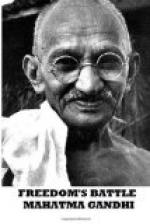I have sent a reply to the writer. But as the views expressed in the quotation are likely to be shared by many of my English friends and as I do not wish, if I can possibly help it, to forfeit their friendship or their esteem I shall endeavour to state my position as clearly as I can on the Khilafat question. The letter shows what risk public men run through irresponsible journalism. I have not seen The Times report, referred to by my friend. But it is evident that the report has made the writer to suspect my alliance with “the prevailing anarchies” and to think that I have “thrown to one side” my “moral responsibilities.”
It is just my sense of moral responsibilities which has made me take up the Khilafat question and to identify myself entirely with the Mahomedans. It is perfectly true that I am assisting and countenancing the union between Hindus and Muslims, but certainly not with “a view of embarrassing England and the Allied Powers in the matter of the dismemberment of the Ottoman Empire,” it is contrary to my creed to embarrass governments or anybody else. This does not how ever mean that certain acts of mine may not result in embarrassment. But I should not hold myself responsible for having caused embarrassment when I resist the wrong of a wrong-doer by refusing assistance in his wrong-doing. On the Khilafat question I refuse to be party to a broken pledge. Mr. Lloyd George’s solemn declaration is practically the whole of the case for Indian Mahomedans and when that case is fortified by scriptural authority it becomes unanswerable. Moreover, it is incorrect to say that I have “allied myself to one of the prevailing anarchies” or that I have wrongly countenanced the movement to place the cruel and unjust despotism of the Stamboul Government above the interests of humanity. In the whole of the Mahomedan demand there is no insistance on the retention of the so-called unjust despotism of the Stamboul Government; on the contrary the Mahomedans




